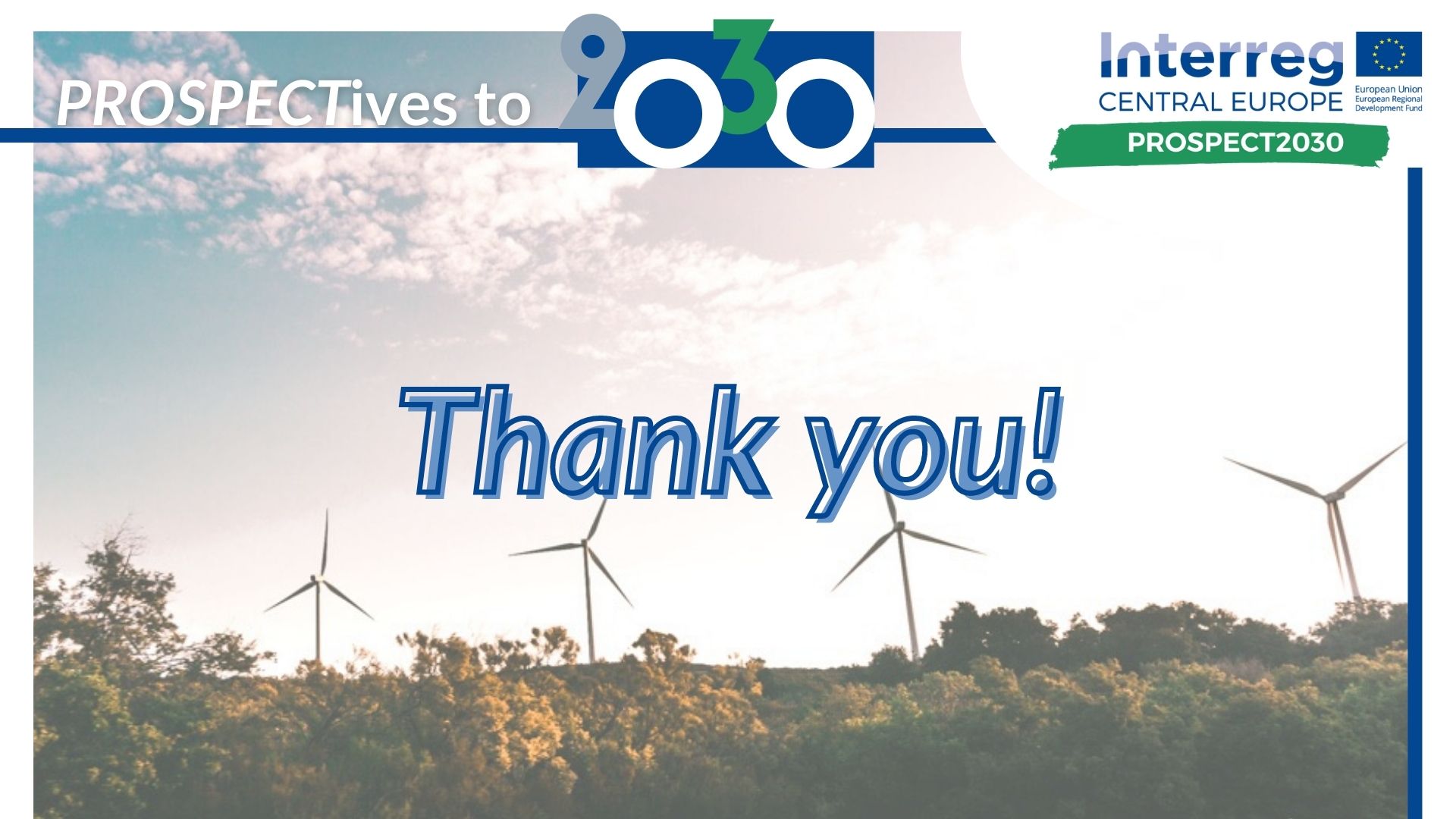PROSPECTives to 2030: FOLLOW UP
On the last day of November and the first of December we presented our PROSPECTives to 2030 to more than 60 participants and many guests! The occasion has been PROSPECT2030’s final conference, a two-day online event that wraps up three years of project work and tries to look ahead, with a toolkit of policy recommendations for a better use of public and private funds and seven regional action plans for Eco Energyland (AT), Mazovia (PL), Friuli Venezia Giulia (IT), Piemonte (IT), Saxony-Anhalt (DE), Southern Great Plain (HU) and Split-Dalmatia (HR). We reflected on the lessons learnt from the current EU programming period, presented insights from our targer regions and looked at a functional approach to energy transition planning and at the role of renewable energy communities to foster the energy transition.
- The first morning we concentrated on “Unlocking financing for energy efficiency”: after an introduction by Silvio De Nigris for Regione Piemonte, lead partner of PROSPECT2030, we unveiled to the audience our project video, that tells us about the shift and change needed for the transition to a low-carbon economy, and highlights what we have achieved during the project, with the help of some splendid outdoor footage from our 7 target regions across Central Europe.
- On both days Claudia Pamperl from the Joint Secretariat of Interreg Central Europe programme gave a contribution, first on energy projects and achievements on the current programming period (2014-2020) and secondly on the insight to the new programming period (2021-2027) and the first call.
- Manfred Hotwagner from the European Center for Renewable Energy Güssing focused on the levels of governance of the two pilot regions in the spotlight: Saxony-Anhalt and Split-Dalmatia, on which Pio Lombardi (University of Applied Sciences Magdeburg-Stendal) and Matija Vajdić (Energy Institute Hrvoje Požar) further elaborated. Mr. Lombardi during his presentation remarked that "we need the popolation on our side to speed up the enrgy transition" while Mr. Vajdić underlined how this project tackled the lack of energy data available at local level, and has been a good occasion to push and try to gather data at municipal level in Croatia.
- Károly Oelberg from AACM Central Europe presented the policy recommendations for a better use of public funds and private funds at regional level, developed within the project.
- The final roundtable hosted a fruitful and inspiring discussion among projects SISMA PLUS (Martin Murovec, GOLEA), STEPPING PLUS (Lisa Sentimenti, AESS Modena), EUROPA (Nicholas Stancioff, Ekubirojs) and our own PROSPECT2030 represented by Károly Oelberg. During the discussion emerged the need to address residential buildings - the key challenge in front of us - and the need to offer users a simple service to ensure energy savings in order to achieve deep renovation. Mr Oelberg reminded us that there are many global problems that require public fundings and that they need to be complemented with other sources, for a more integrated approach of all EU instruments. Mr Stancioff stated that "we need a paradigm shift: a transition to a smarter form of energy", Mr Murovec added the importance of the transfer of experience for a good management of deep renovation, while Ms. Sentimenti mentioned the topic of common and clear reporting rules for all the grants on retrofit.
- On the second morning, “Energy communities take off”, Manfred Hotwagner and Giulio Cerino Abdin (Politecnico di Torino) explained the methodology behind the action plans, while Żaneta Latarowska from Mazovia Energy Agency and Francesco Locatelli from APE FVG – the Energy Management Agency of Friuli Venezia Giulia presented an insight from their pilot regions. Ms Latarowska called for a common language among all the local actors, taking into account social conflicts, while Mr Locatelli stressed the need for a clear strategy for the regions to be successfull.
- The round table was populated by projects AURORAL (Nadine Strobl, EEE); EUSALP (Patrick Biard, AURA-EE); RIGRID (Bartolomiej Arendarski, IFF Fraunhofer), PROSPECT2030 (Manfred Hotwagner), concentrating on the role of RECs - renewable energy communities to foster the energy transition. Mr Biard talked about the project ALPGRIDS for increasing the uptake of RES through micro grids in the Alps; while Mr. Hotwagner hinted at the need to reactivate supply chains - from rural to intermediate to city areas and Mr Arendarski underlined how RECs will be an important player in the interconnected power system, Ms Strobl focused on the importance to create incentives to municipalities to extend PV. Some recommendations were remarked: simplification of administrative procedures for energy communities, the need for a clear legislative framework and a service to provide assistance to municipalities, sopport measures at national level and special tariffs or reduced entry costs for addressing energy poverty.
- A very warm thank you to all participants and guests!
- The event has been recorded! You can watch the recording of DAY 1, and of DAY2.
- You can also download the full agenda and the presentations at this link.
- CONTACT INFORMATION
- If you wish to contact us, please write to silvio.denigris@regione.piemonte.it and barbara.girardi@regione.piemonte.it

